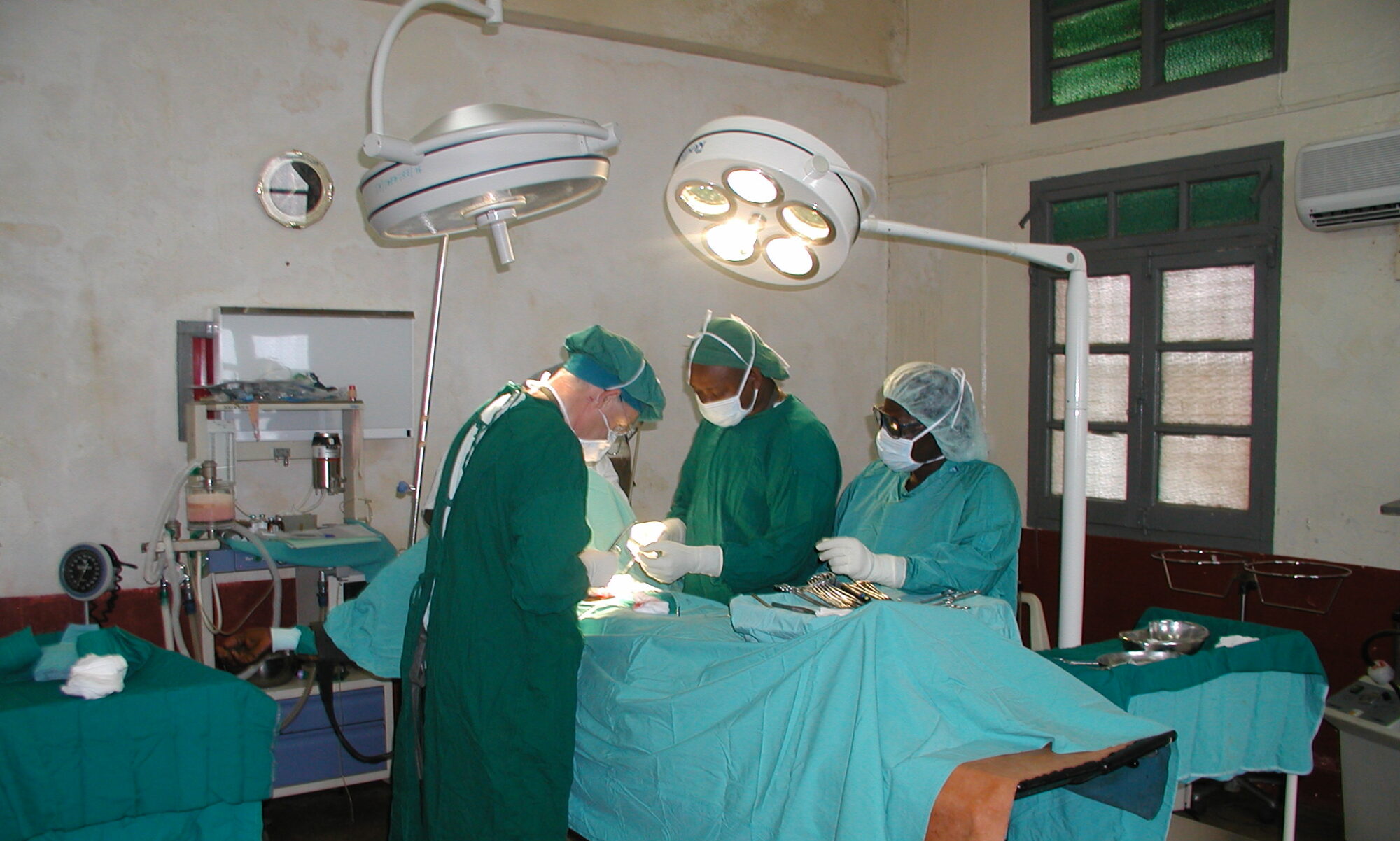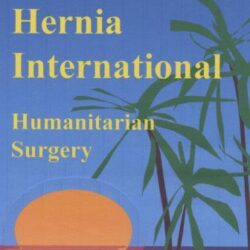REPORT
NIGERIA CAMP 2024
BISHOP MURRAY MEDICAL CENTER. MAKURDI.
Jun-5-2024
TECHNICAL REPORT
DATES AND DEPLOYED LOGISTIC

The team of collaborators began to be formed at the end of February 2024 under the leadership and coordination of Dra Teresa Butrón and under the umbrella of the Non Profit Organization “Cirujanos en Acción” (Surgeons in Action) and the collaboration of Hernia International Foundation. In a very short period of time, it could be formed a team of twelve people, including general and paediatric surgeons, paediatrics intensivist, anesthetists and nurses.
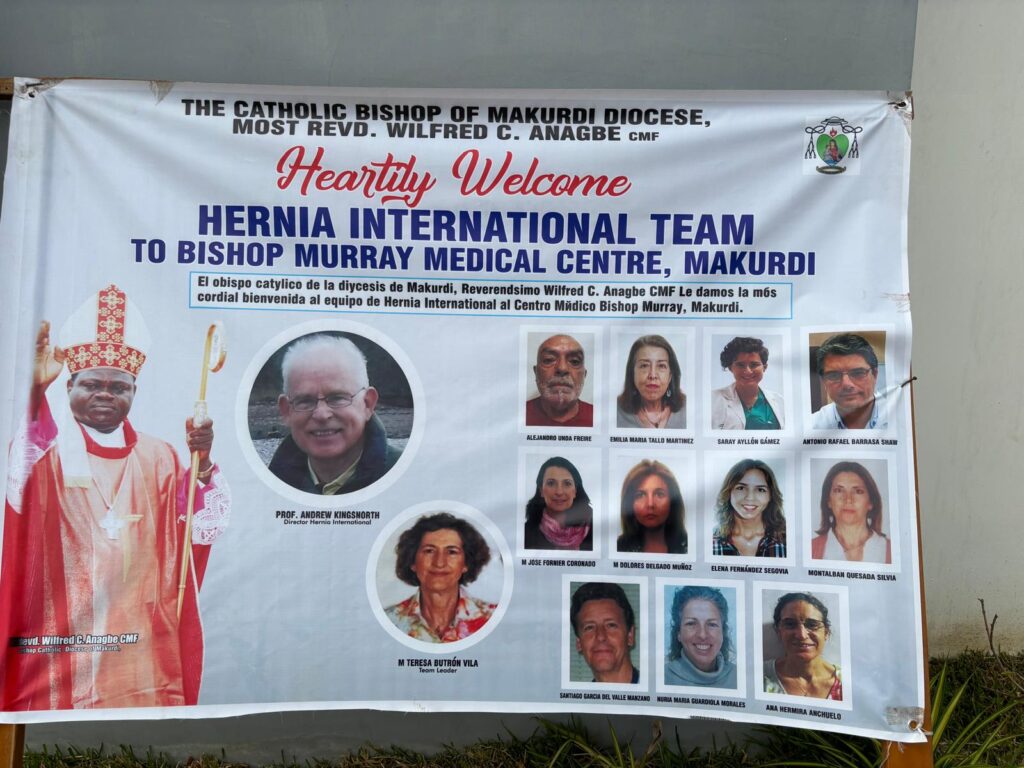
All volunteers collected all the consumable material needed for the campaign, including surgical gowns, drapes, surgical fields, sutures, meshes of different types and sizes, bladder catheters, sterile and operating gloves as well as drugs (local and general anaesthetics, muscle relaxants, antibiotics, opioids, analgesics, etc) and anaesthetic material such as spinal needles, epidural catheters, Laryngeal masks, endotracheal tubes and rest of the material.
The 12 de Octubre University Hospital, in Madrid, donated a large amount of medication including anaesthetics, analgesics, antibiotics and vasoactive drugs through the anesthesiologist of that hospital, Dr. Ana Hermira.
The University Hospital Virgen de las Nieves in Granada, through Silvia Montalbán, a nurse at the hospital, donated a large amount of material, including surgical gowns and sheets, electric scalpels and intravenous access equipment.
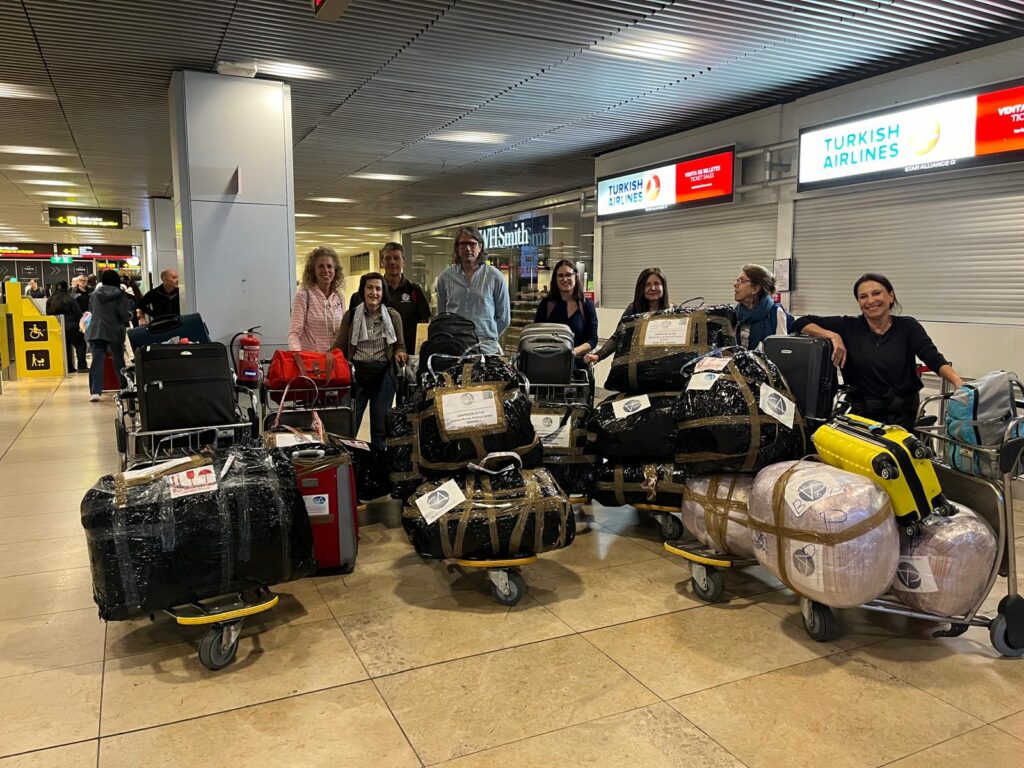
The air tickets were taken through Angelis (freelance of Halcon Viajes Company) with the company Turkish Airlines, which allowed the transport of 2 bags of 23 kg per person + cabin baggage.
- VISA. Without a doubt, obtaining VISA from Nigeria’s Embassy in Madrid, was the greatest difficulty that we had to face and that seriously jeopardized the completion of the campaign. Thanks to the efforts of Teresa Butrón and Dolores Delgado and their persistence we were able, just three days before leaving, to obtain VISA for Nigeria for all the members of the team. It is possible to apply for the VISA online and make the payment and after that it is necessary to go the Nigeria’s Embassy in Madrid to present the VISA application form, the invoice and the passport. Therefore, all the cooperators living outside of Madrid had to send their original passports by mail to one of the team members in Madrid to present them all together as a group. We got the VISAS only three days before leaving for Nigeria. For all of those reasons it seems advisable and it is our recommendation, to start the process at least six weeks in advance.
Dr Austin Ella, Associate Director Program Management from Catholic Caritas Foundation of Nigeria (CCFN) and Catholic Secretariat of Nigeria Building was our local contact in Nigeria and our interlocutor with Bishop Wilfred Chikpa Anagbe.
The group of volunteers left Spain from different cities (Málaga, Valencia, Madrid) between Friday and Saturday, April 19 and 20, 2024. Ten of the team members met at the Istanbul airport while two of our surgeons arrived at Abuja a day before the rest of the team
The campaign ended on Saturday, April 27, 2024 and we arrived to Spain on Monday 29th.
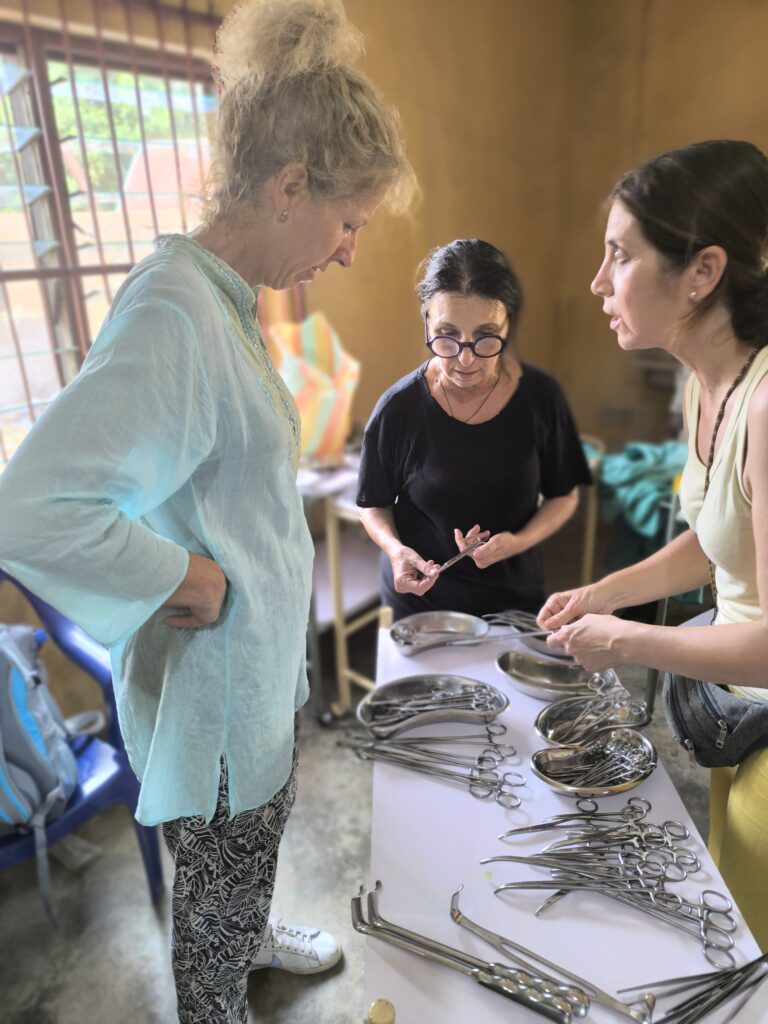
PATIENTS. Altogether 155 patients were operated on during the campaign period
ADULTS PATIENTS: A total of 93 surgical procedures were performed in 80 adult patients. There were 14 females and 66 males. Age ranged from 16 to 76 years (median 50; interquartile range 36-62). The following procedures were done:
Lichtenstein: 69 cases
Nyhus: 10 cases
Lipoma removal: 3 cases
Pre-peritoneal mesh repair: 2 cases
Rives-Stoppa: 2 cases
Hydrocelectomy: 2 cases
Reinforced suture + umbilical prefascial hernia repair + fascia plication: 1 case
Nuck’s cyst removal: 1 case
Onlay: 1 case
Orchiectomy: 1 case
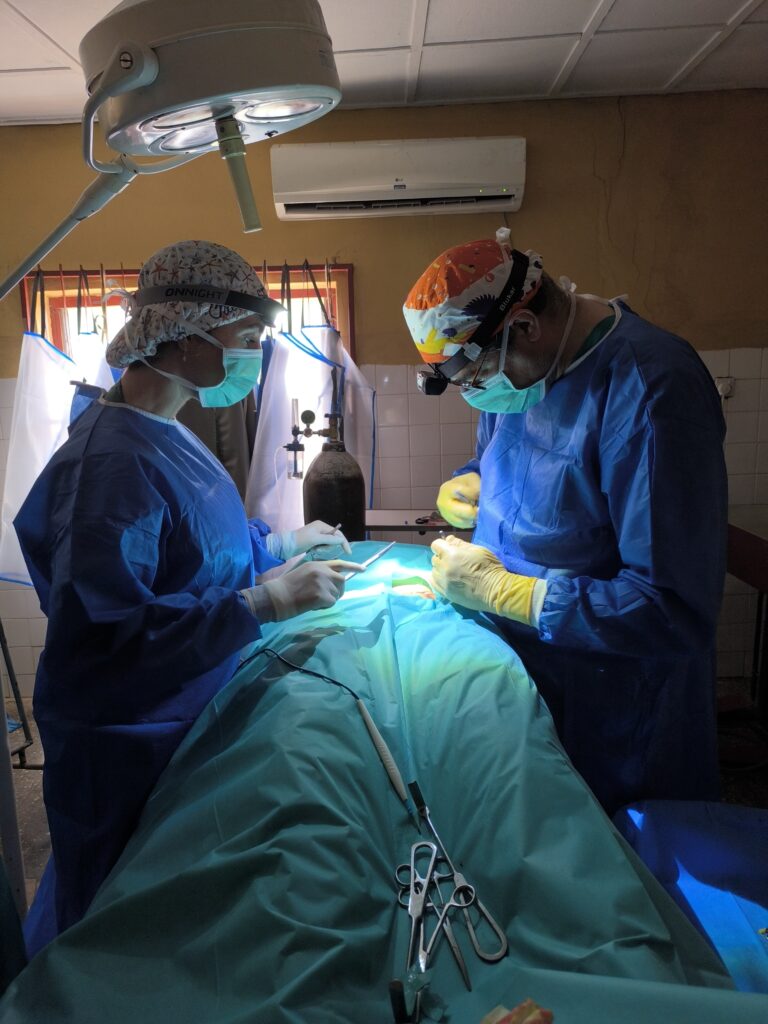
Haemorrhoidectomy: 1 case
Most of the cases under spinal anesthesia (77 patients), saddle block (1 patient) and local anaesthesia plus sedation (2 cases)
PAEDIATRICS PATIENTS. 99 procedures were performed in 75 paediatric patients. Seventeen females and 58 males. Age ranged from 3 months to 16 years (median 6; interquartile range 3-10).
Herniorrhaphy: 92 cases
Herniorrhaphy plus hydrocele: 1 case
Hydrocele: 4
Orchidopexy: 1 case
Dermoid cyst resection: 1 case
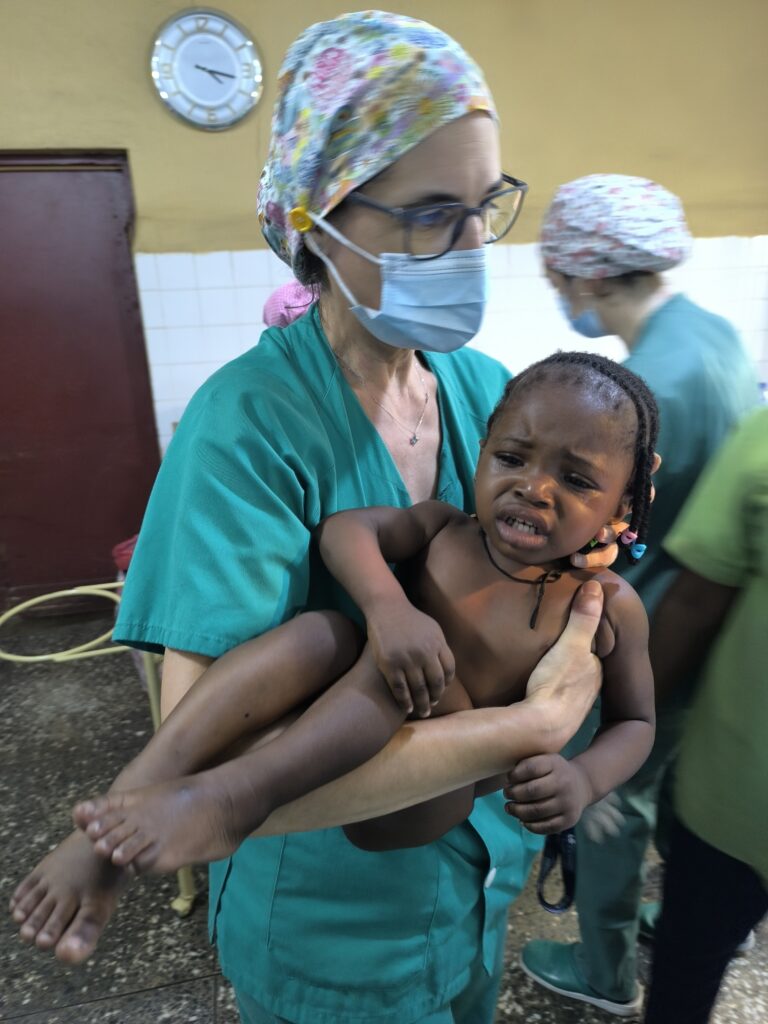
Several cases of the initially scheduled were left without being operated on due to the lack of enough time.
All the members of the team agreed about the need to know more in depth the scheduled cases to made a more appropriate surgical list of patients. It was the first mission there in Makurdi and probably the situation will improve in future missions.
We also had the opportunity to participate in two cases of urgent caesarean section: fetal distress in one case and previous caesarean section in the other. Both patients were operated under spinal anaesthesia and two general surgeons from CeA helped Dr Thadeus Aende in the surgery and also did it the nurses of the team. It was very gratifying for all of to participate in that task and see the good evolution of mothers and newborns.
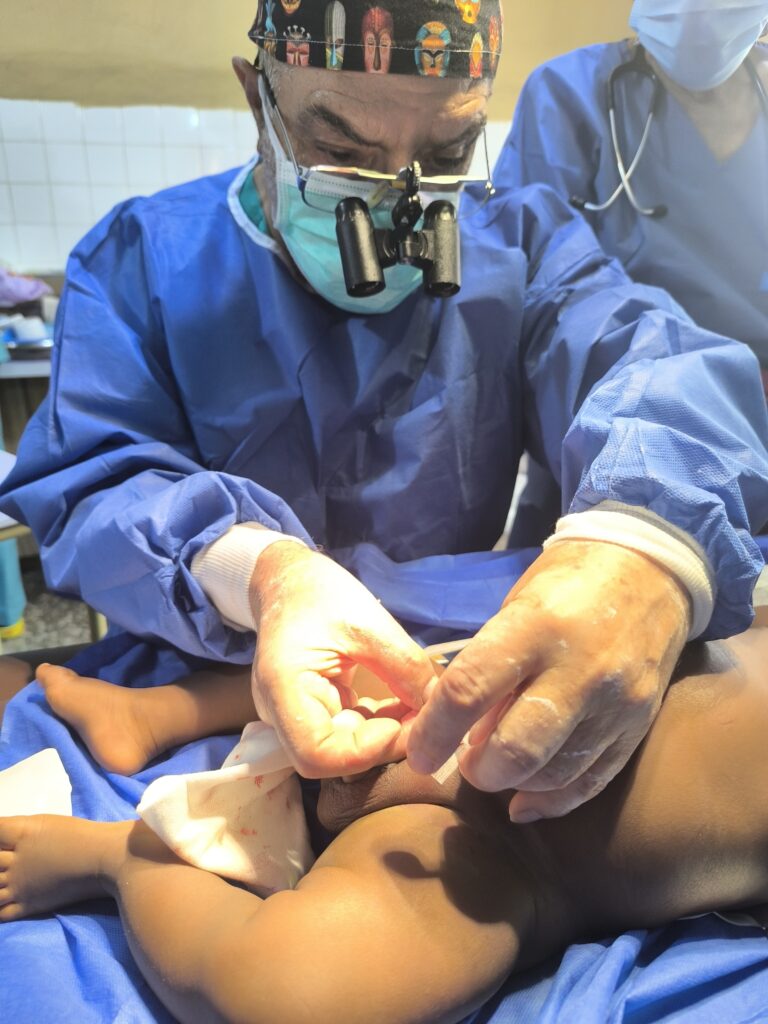
COMPLICATIONS: Once the team left Makurdi Hospital, the follow up of patients was done by Dr Thadeus Aende, a local doctor. Up to now, there have been four early minor complications: one adult patient experienced a recurrence of his inguinal hernia and, in the paediatric population, a boy developed a wound abscess drained while the team was still in Makurdi, one more a reactive hydrocele and, lastly, a possible recurrence of a hernia or simply a local edema difficult to know from the pictures Dr Thadeus Aende sent to the paediatric surgeons.
CAMPAIGN REPORT
THE PLACE. The Federal Republic of Nigeria, is a country in West Africa. It covers an area of more than 923.000 square kilometres and with a population of over 230 million, it is the most populous country in Africa, and the world’s sixth-most populous country. Nigeria is a federal republic comprising 36 states and Abuja is the capital even though the largest city is Lagos. Nigeria became a formally independent federation on 1 October 1960. It experienced a civil war from 1967 to 1970, followed by a succession of military dictatorships and democratically elected civilian governments until achieving a stable government in the 1999 Nigerian presidential election, with the election of Olusegun Obasanjo of the People Democratic Party. Nigeria is a multinational state inhabited by more than 250 ethnic groups speaking 500 distinct languages. The official language is English. Nigeria’s constitution ensures de jure freedom of religion and it is home to some of the world’s largest Muslim and Christian populations. Nigeria is divided roughly in half between Muslims, who live mostly in the north part of the country, and Christians, who live mostly in the south; indigenous religions, such as those native to the Igbo and Yoruba ethnicities, are in the minority.
Nigeria’s economy is the second-largest in Africa, the 39th-largest in the world by nominal GDP, and 27th-largest by PPP. However, the GDP per capita places it in 149th place out of 196 countries and the Human Development Index prepared by UN which shows the standard of living indicates that Nigerians are among those with the worst quality of life in the world.
Benue state was created on February 3, 1976. It lies roughly in the middle of the country. Benue has a population of more than 4,5 millions inhabitants. The state comprises of several ethnic groups being The Tiv the dominant ethnic group, occupying 14 local government areas, while the Idoma and Igede occupy the remaining nine local government areas. Most of the people are farmers while the inhabitants of the riverine areas engage in fishing as their primary or important secondary occupation. The people of the state are famous for their cheerful and hospitable disposition as well as rich cultural heritage. Makurdi, the State capital was established in the early twenties. Being a river port, it attracted the establishment of trading depots by companies such as UAC and John Holt Limited. Its commercial status was further enhanced when the Railway Bridge was completed and opened in 1932. In 1976, the town became the capital of Benue State and presently serves also as the headquarters of Makurdi Local Government Area.
THE TEAM was composed by a total number of 12 volunteers:
- General Surgeons: Teresa Butrón Vila (team leader). Antonio Rafael Barrasa. Saray Ayllón Gámez. Elena Fernández Segovia.
- Paediatric surgeons. Alejandro Unda Freire. Mª Dolores Delgado Muñoz.
- Paediatric intensivist. Emilia María Tallo Martínez.
- Anaesthesiologists. Ana Hermira Anchuelo. Santiago García del Valle
- Nurses. Mª Josefa Fornier Coronado. Nuria Guardiola Morales. Silvia Montalbán.
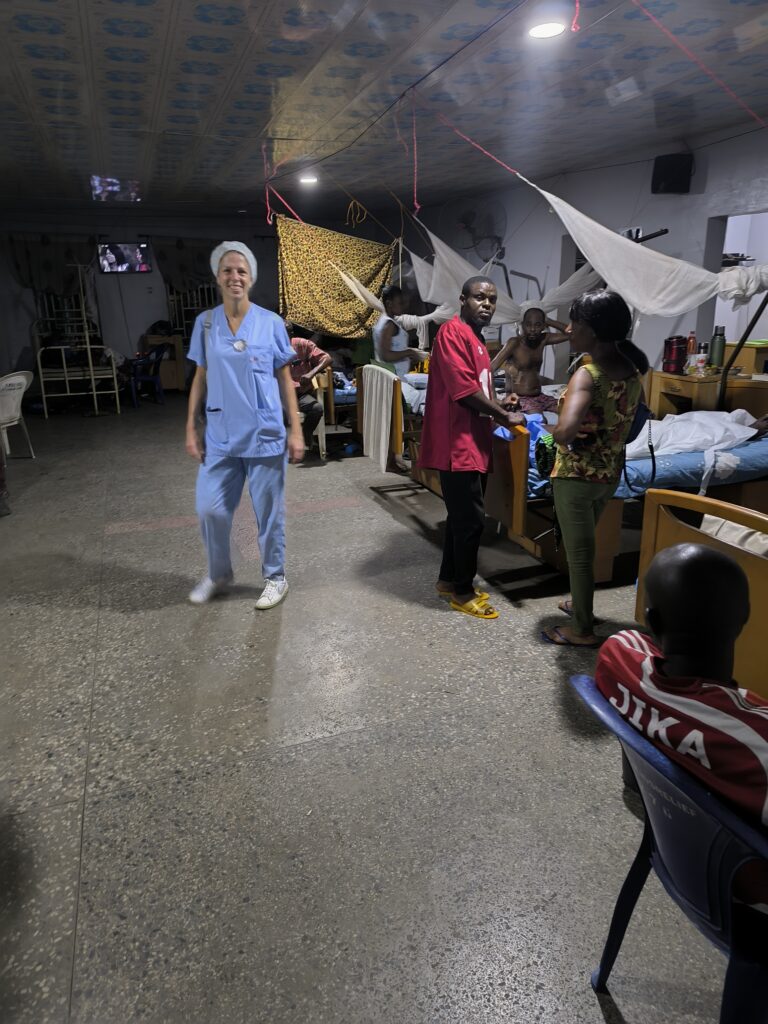
LOCAL STAFF. El Dr Thadeus Aende was the only doctor available at the hospital even though there were a large number of volunteers carrying out tasks of organization and identification of the population. Father Peter Paleva was the Area Health Coordinator. Mr Nicholai Ahor was the Administration Secretary.
HOSPITAL. It is a small building all in a single height, with several wards for adults, men and women, and children. It has a laboratory for basic determinations and a microbiology laboratory with basic capacity to perform cultures and diagnostic test for pathologies such as malaria and HIV. The room we use as an operating room is a large elongated space, equipped with air conditioning (the only space in the hospital except offices), without running water and equipped with minimal material: oxygen cylinders, two basic monitors (ECG did not work correctly) and 3 very rudimentary operating tables, one of then without the possibility of modifying height or changing the position of the patients. There was no anaesthesia machine available. There was no recovery room so the adult patients had to go directly to the ward, not far from the OR. For the children Dr Emilia Tallo created a small room as a space where to look for the children several minutes after the operation. The heat and humidity in that space was terrible and that made Emilia’s work very difficult and to be grateful for all of us. Several portable pulse oxymeters led by cooperators alleviated partially the monitoring deficit.
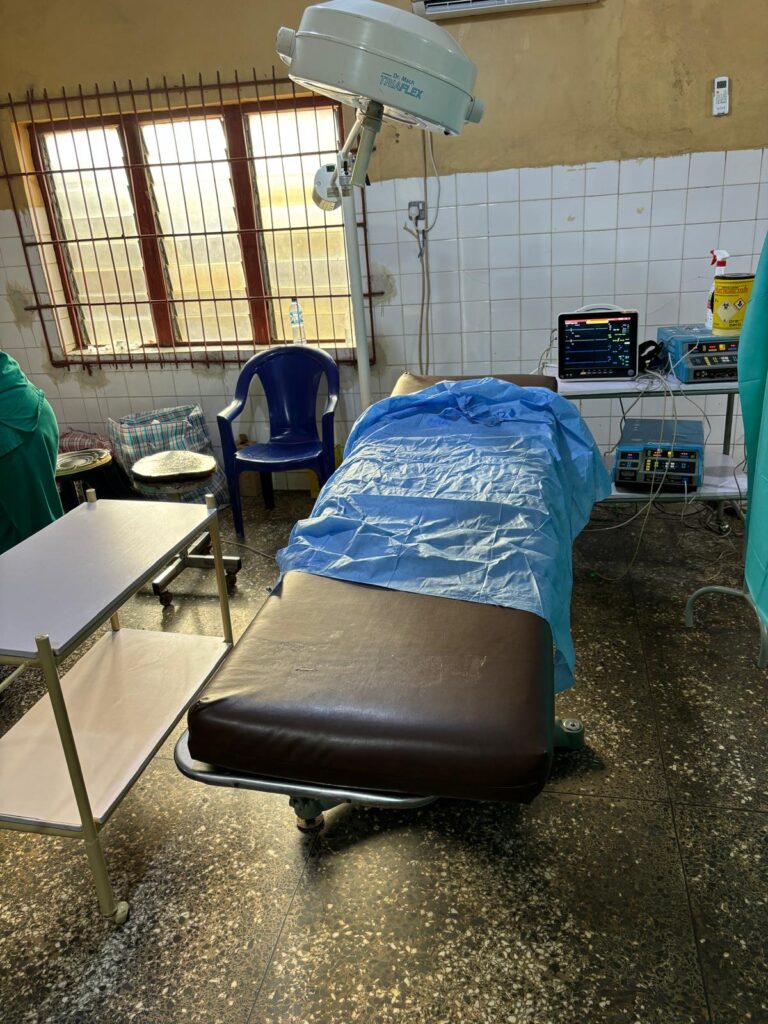
EQUIPMENT. Surgical instruments available at the Bishop Murray Hospital such as forceps, separators or scissors are not in very good condition and no suitable sizes for some of the longer and more aggressive interventions. It was completed with the paediatric surgical material carried by Alejandro Unda. There were
2 diathermy generators, one from the own hospital and one brought from Abuja and the team could transport 2 more units from Spain even though we have to use only one of them. The surgical lights were scarce and very poor in intensity and difficult or impossible to handle.
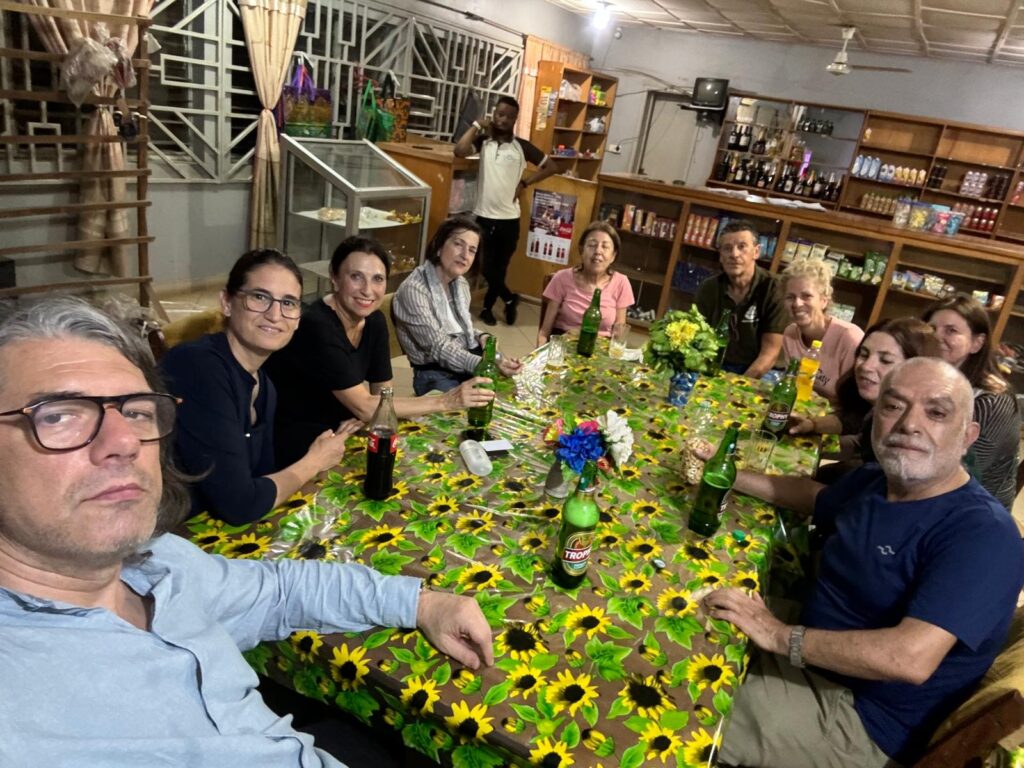
ANAESTHESIA. The lack of an anaesthesia machine made the task of Dr Ana Hermira and Dr Santiago Gª del Valle very difficult since they had to combine spinal anaesthesia with regional anaesthesia of the trunk with sedation or even general anaesthesia under spontaneous breathing. We made Dr Ella aware of the need to acquire a simple anaesthesia machine for the future campaigns and, thus, a report was sent to him with a description of the minimum characteristics and capabilities that anaesthesia should have.
ASEPSIS: Sterilisation was carried out with a heat-operated autoclave in a room adjacent to the operating room.
OUR DAILY LIFE
We arrived at Abuja International Airport on Saturday 20 April at 20:00. There were no difficulties with customs formalities and from there we were transferred to the Catholic Residence from Bishop Office and Caritas Organization only a few kilometres away from the airport where we met the rest of our colleagues. In that residence we had dinner and spent the first night.
Early in the morning of Sunday 21th April we went to Makurdi by car and it took 4 four and a half hours to made the 280 kilometres. Once at the hospital we had a colorful and pleasant welcome ceremony after which they offered us a meal to, immediately afterwards, inspect the operating rooms and the rest of the hospital, review the available material and unpack and organize the large amount of material that we moved from Spain.
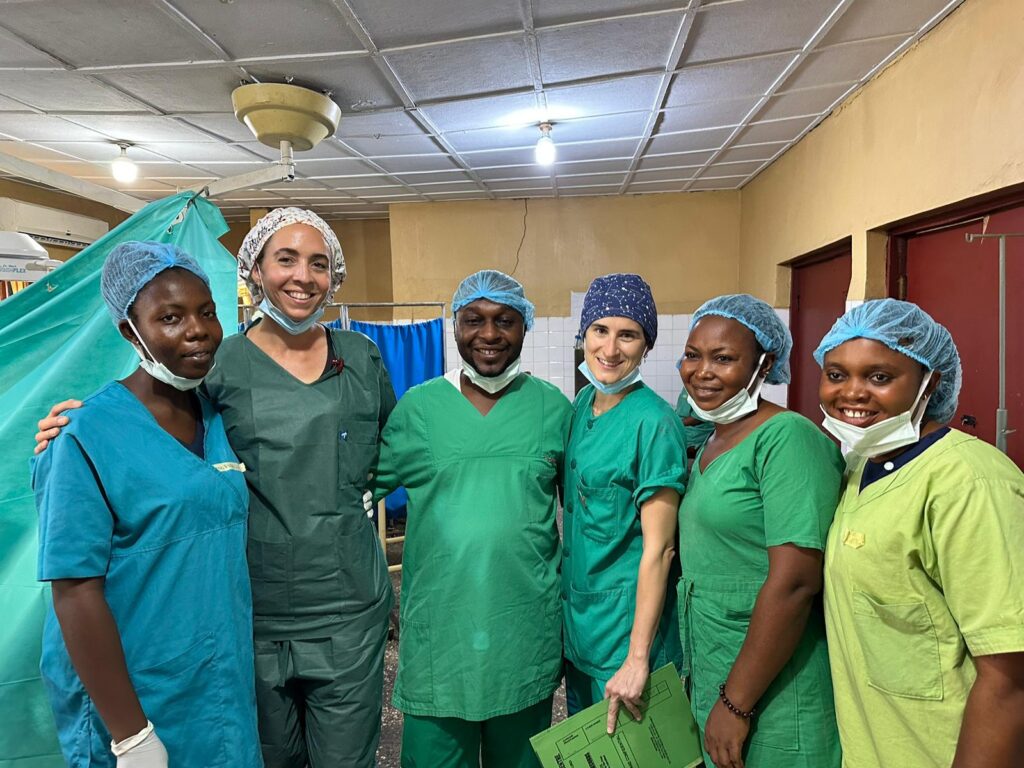
We had lunch in the hospital and the food was of good quality but it is important to warn the cooker, Rosario Joyn Egbol and Dr Celeste Conde (also Medical Director of the Hospital), not to add spice. Delicious were also the great variety of mangoes we could taste.
After the daily work we took dinner at the residence. The rooms were comfortable with shower and, most importantly, air conditioning. It is important to take with you some towels.
We worked during 6 days (Monday to Saturday inclusive) from 8:00 to 20:00 or even later several days. On Wednesday 24th the Bishop offered us a nice dinner in the garden of the residence. We had no time even to visit the city center neither the riverside of the imponent Benue River.
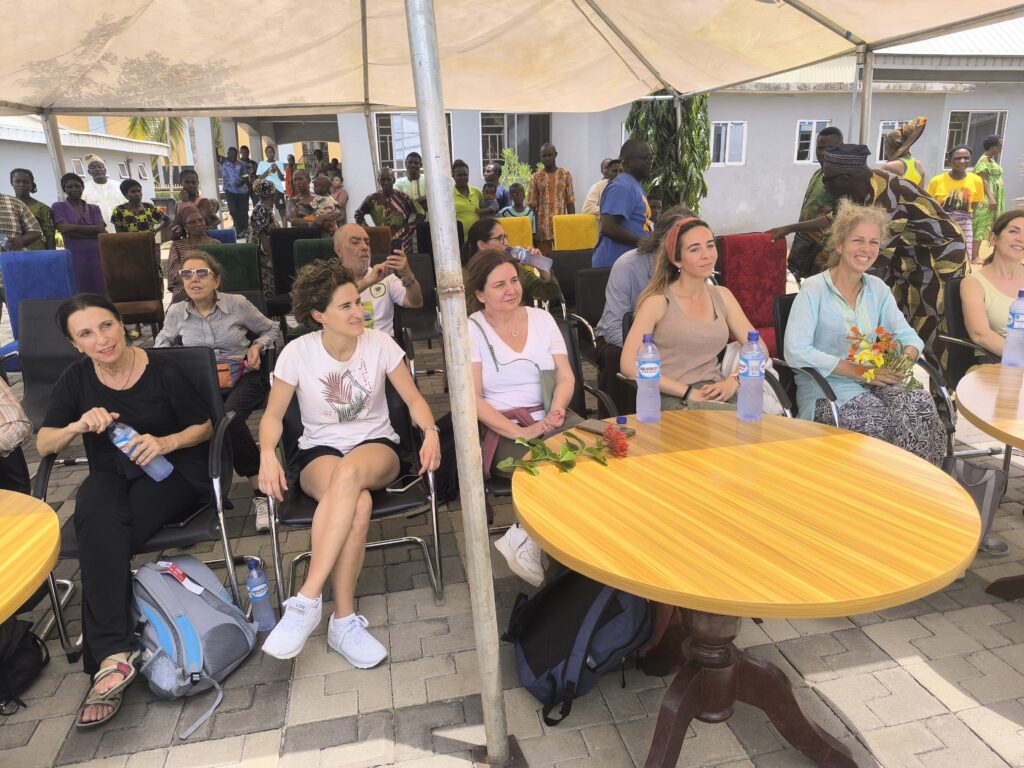
On Sunday 28th we were invited to a religious ceremony and after that we came back to Abuja’s airport. The trip was made difficult by two car breakdowns that delayed our arrival at the airport to such extent that we almost missed our flight and were allowed to carry only our hand luggage and had to leave the rest of the equipment in Abuja under the care of Dr Austin Ellla who was later in charge of sending all the material back to Spain several days later.
CONCLUSION
Strengths of this place: Probably there is a huge amount of population who would benefit of a surgery from CeA. The people were very warm towards us and expressed continuously their gratitude. A lot of local volunteers, poor organized ass it was the first mission but they helped us a lot with the management of patients and families.
Improvement objectives: It would be very useful for future campaigns to have an anaesthesia machine and a new basic monitor of vital signs. It is desirable to improve the surgical lights as well as the surgical tables because they must have the capacity to vary their height and change the position of the patients during surgery. Also is important to improve the cars for the transport from Abuja to Makurdi and back to the airport since the space for the people and equipment was very limited. Have running water in the operating room, as occurs in other areas of the hospital, could facilitate work and help reduce the chance of surgical infections.
BUDGET:
COST FOR PERSON: Flight tickets between 600 and 750€. Hotel and maintenance provided by the local organization without cost. VISA 100€. Total amount around 700-850€ per volunteer.
Signed in the name of all the team members:
Santiago García del Valle Manzano
